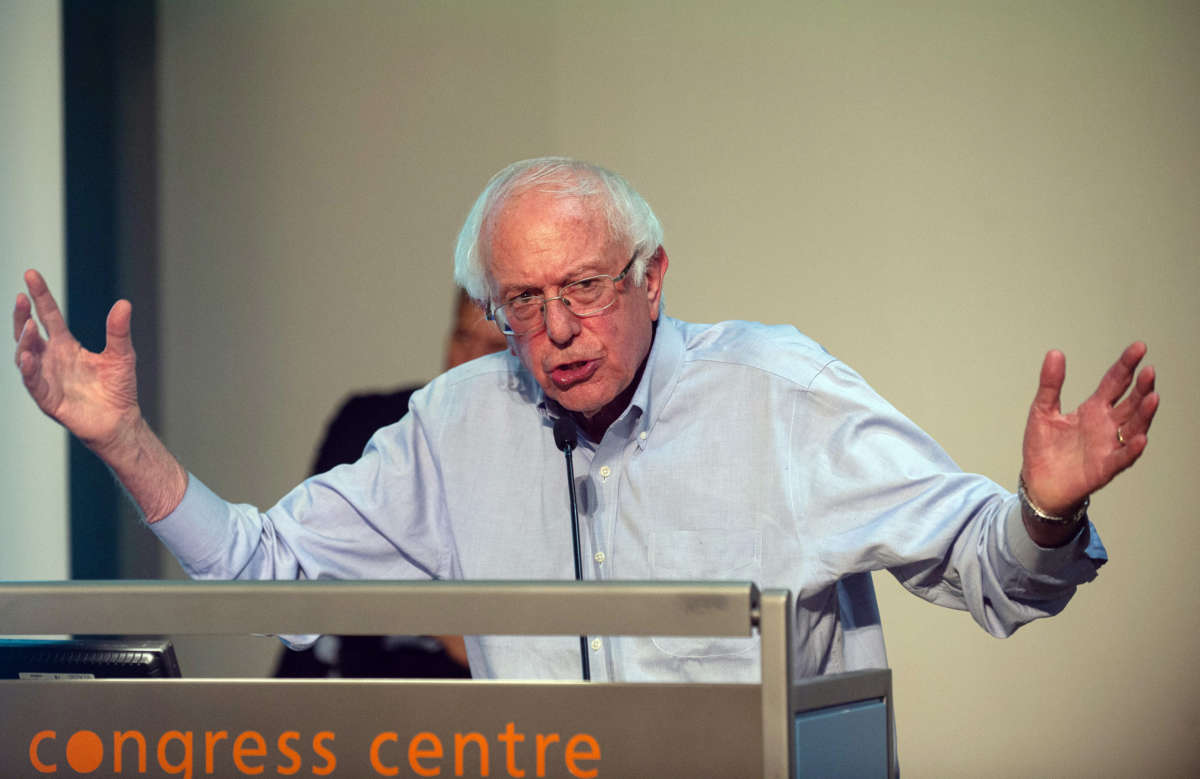Honest, paywall-free news is rare. Please support our boldly independent journalism with a donation of any size.
Sen. Bernie Sanders recently delivered an impassioned speech at the Trade Union Congress headquarters in London against rampant inequality, expressing his support for striking railway, maritime and transport workers throughout the U.K.
The rally was part of the “Enough is Enough” campaign, which was launched by Rail, Maritime and Transport Workers union leader Mick Lynch and other union heads in the U.K., to highlight the crisis of inequality that has caught the U.S., the U.K., and many other countries in a destructive vise.
Lynch has become something of a labor celebrity in the U.K. this summer, as a wave of strikes has swept the country, bigger than anything since the Winter of Discontent in 1979. Workers in a range of sectors, from transport to medical care, from lawyers to teachers, either have already struck or are gearing up to strike in the face of rampant inflation (now above 10 percent in the U.K.) eating away at the purchasing power of their wages. And, unlike earlier periods of mass industrial action, the unions are enjoying significant public support.
In articulating a broad vision of economic equity and fairness, Lynch, in particular, has filled a void left by Opposition Leader Keir Starmer’s Labour Party, which has retreated from many of the more radical policies of his predecessor, Jeremy Corbyn. In an era of soaring gas and energy prices, Starmer’s refusal to commit to nationalizing energy companies has come under withering criticism from Lynch and others. So too has the party’s refusal to wholeheartedly throw its support behind the striking workers. Indeed, earlier this summer, Starmer disciplined parliamentary members who participated in demonstrations supporting the railway workers.
Sanders’s decision to travel to the U.K. to fully embrace the Enough is Enough campaign marked a watershed moment. Most politicians are, with good reason, often reluctant to step into the roiling waters of other countries’ domestic politics. However, Sanders clearly saw the need to draw attention to the shared experiences between U.S. and U.K. workers, especially during these pandemic-and-inflation-cursed years, and the need for international solidarity.
“Today in America you have three multi-billionaires who own more wealth than about half of American society,” Sanders explained. “In your country, you have 100 people on top who own more wealth than the bottom 18 million people. No-one can tell me from a moral perspective or an economic perspective that it makes any sense at all that so few have so much and so many have so little.” He continued, “In the U.K. and the United States we have got to get our priorities right, and that means creating a government and an economy that work for all, not just for the few.”
The two-time presidential hopeful talked of three companies in the U.S. controlling assets worth $20 trillion. And he denounced demagogues “who want to divide us by the color of our skin, or where we were born, or sexual orientation, or whatever.”
Sanders’s 15-minute speech laid out the urgency of coordinated international campaigns to wrench power away from wealthy elites and back toward the people. “We’re seeing a massive redistribution of wealth going in exactly the wrong way,” he declared, talking about how the pandemic had accelerated wealth concentration at the top of the economy, and how a set of interconnected crises were worsening rather than ameliorating inequality. “Our job is to take on these oligarchs. And our job is to imagine a world of justice.”
Sander didn’t mention, but might have, that recent data shows average U.S. life expectancy since the start of the pandemic has declined by a startling three years. Disproportionately, those dying younger are poor, nonwhite — the starkest declines are actually in Native American communities — and non-college-educated. Their reduced life expectancy is caused primarily by COVID-19, but also by increased deaths of despair in an increasingly unequal society — deaths attributed to suicide, drug overdoses, alcoholism and gun violence.
In the U.K., life expectancy also fell significantly during the pandemic; perhaps more surprisingly, the life expectancy gap between wealthy areas and poor areas increased by roughly a year, for both men and women, from 2018 to 2020. Much of this predates the pandemic: Female life expectancy in the poorest areas of the U.K. has actually fallen, in absolute terms, from 2011 onward. As in the U.S., a vastly disproportionate number of COVID deaths have also fallen on the nonwhite population.
In both the U.K. and the U.S., support for unions, and for workers’ rights more generally, is on the rise after decades in which labor organizations have been on the defensive. Workers in Starbucks cafes and Amazon warehouses have launched high-profile organizing efforts over the past couple of years, and polls show more public support for unions in the U.S. today than at any time in nearly 60 years.
“You’re seeing people at the top, people who are phenomenally rich becoming richer, a middle class continuing to shrink, and millions and millions of people living in abject poverty,” Sanders told his enthused audience. “Working people all over the globe have got to stand together and tell the oligarchs they cannot win.”
Media that fights fascism
Truthout is funded almost entirely by readers — that’s why we can speak truth to power and cut against the mainstream narrative. But independent journalists at Truthout face mounting political repression under Trump.
We rely on your support to survive McCarthyist censorship. Please make a tax-deductible one-time or monthly donation.
